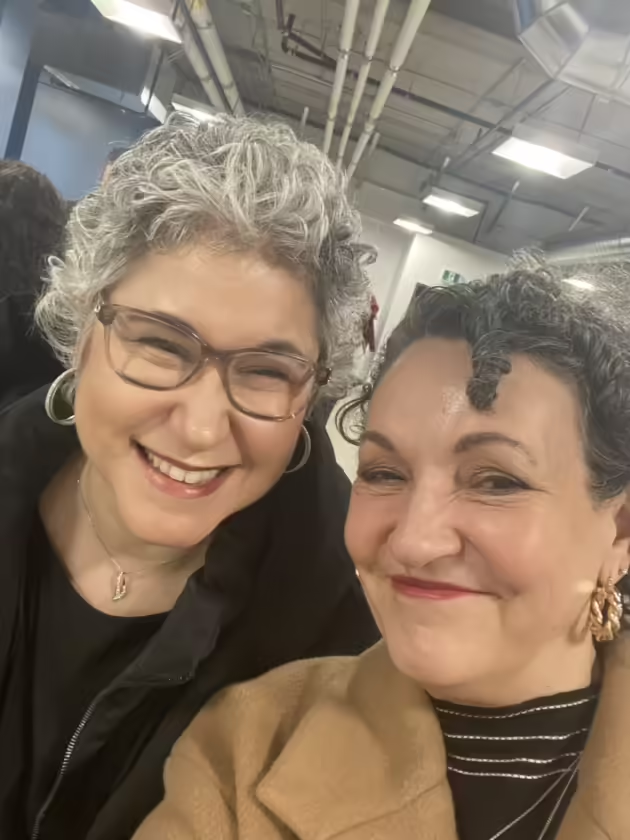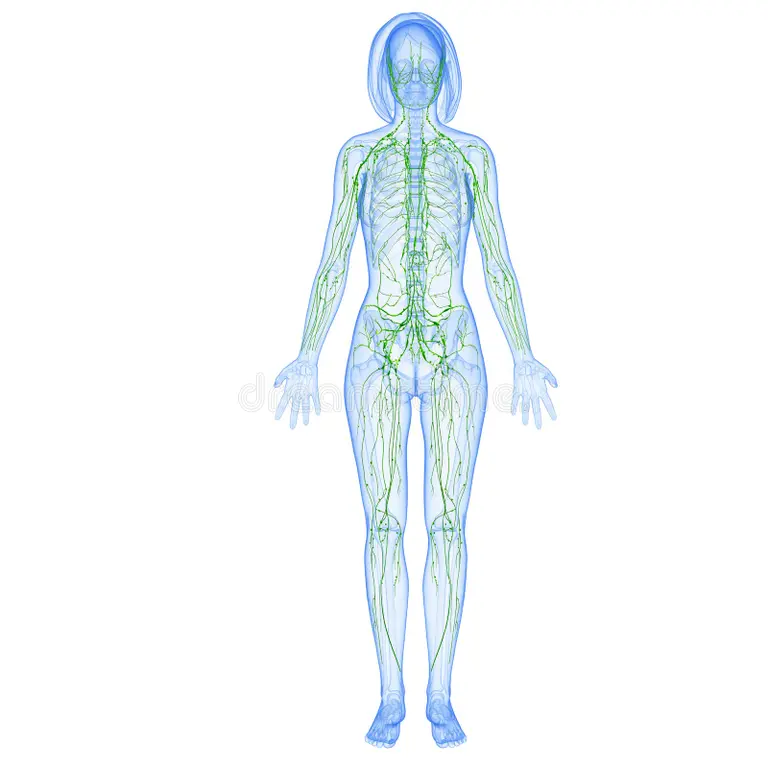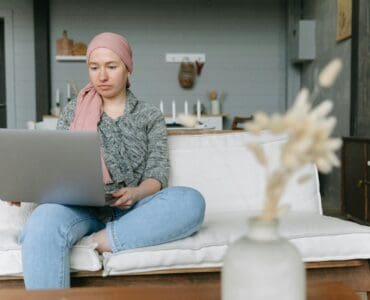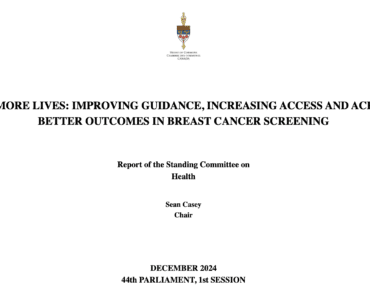Guest post by Brandie Smith
Reaching 40 felt like a milestone where I could finally look back and appreciate the life I had built and the person I had become. Instead of dreading the big 4-0, I embraced it. I was proud of my life — a beautiful daughter, a supportive husband, a career I enjoyed, and a strong and healthy body. To mark this new chapter, I scheduled my first mammogram on the day after my birthday. It felt symbolic, a rite of passage into this new decade. But the excitement faded when that first mammogram led to a follow-up ultrasound. My 40s were not turning out as I had envisioned. In fact, it was the beginning of a breast cancer journey I never saw coming.
Laying on the table for the ultrasound, I couldn’t shake the feeling that something was wrong when the technician started examining the lymph nodes in my armpit. Imagining my 3-year-old daughter’s face was the only thing helping me hold back a wave of panic. When the doctor came into the room, she spoke with a clinical calmness that felt surreal compared to the whirlwind of emotions I was experiencing. She said she was confident one of the masses in my breast was cancer, along with an enlarged lymph node. She assured me I was in good hands for the treatment ahead.
Returning home, I broke down in tears. My husband rushed downstairs sensing something was wrong. Through my sobs, all I could manage to say was, “I have breast cancer”, over and over. And as if that wasn’t enough, the next day brought the unexpected blow of being impacted by a mass layoff at my company.
Breast Cancer Caused the Loss of Who I Was
Within the span of just 24 hours, everything I had worked so hard to build – the life I had proudly embraced – felt like it unravelled in an instant. All that I knew myself to be slipped away as I transitioned from full-time and mom and professional to full-time patient.
Had I not been diagnosed with cancer, losing my job would have felt like a personal blow. But with the reality of life-or-death decisions looming, I found myself oddly detached from it. After a few hours, I began to see the layoff as a blessing in disguise. I knew myself well enough to realize that I would have tried to keep working through treatment, pushing myself too hard and spreading myself too thin between work, home, and healing. When my oncologist asked about my job during our first visit, she actually said it was ‘great’ that I had been laid off—now, I could focus solely on myself.
But that didn’t make the loss of my professional identity any easier to bear. I had always taken pride in being a hard, reliable employee. Now, suddenly, I was faced with empty days stretching ahead of me. I felt frozen during those six weeks of waiting for treatment to start. I didn’t have a job to go to, and my daughter was in daycare. I spent my days sitting on the couch, googling tips for chemo, cold capping, and surgery options, but I couldn’t bring myself to look up what my diagnosis of Triple Positive Invasive Ductal breast cancer actually meant. That was a reality I wasn’t ready to face.
I decided to share my diagnosis publicly on the day I started treatment. Normally, I’m a private and independent person, but I realized that if there was ever a time to lean on others, this was it. I opened up about the good, the bad, and the ugly, and my community rallied around me in ways I hadn’t expected. I tried to keep things light for my daughter, turning the loss of my eyebrows into something funny so she wouldn’t be scared. Despite cold capping, I still ended up with bald spots on my crown and a receding hairline. Most days, I felt awful and kept to myself in my bedroom, or on the couch during my better days. But on my best days, I pushed myself to get out of the house, finding some solace in painting pottery. The chemo took a toll, and I ended up hospitalized twice due to side effects. I could feel myself getting slower, weaker, and my thoughts and speech became muddled.
What hurt the most was feeling like I was sitting on the sidelines during my daughter’s precious early years. I wasn’t the one bathing her, reading her a bedtime story, or tucking her in at night. Instead, she was the one coming into my room to kiss me goodnight, or to hug me in the morning before heading off to daycare. I wasn’t taking her to gymnastics anymore—I was seeing photos of the adventures my husband took her on. I refused to give up our snuggles and smooches, even if it meant I was sick more often because of it, but that was a price I was willing to pay.
I had to constantly remind myself that sacrificing one year during my daughter’s childhood to treatment was a trade-off for many more years together. During the month between my last chemo session and my surgery, I threw myself into planning and enjoying every Christmas event I could with my family. I felt like I had lost so much time, and I wasn’t going to let another moment slip by.
I had five months to decide on my surgery, and while I knew in my heart that going flat with a double mastectomy was the right choice for me, my mind kept second-guessing itself. I was frustrated that I even had to make this decision in the first place. A week before surgery, I came across and read Flat and Happy: Mastectomy and Flat Closure – A Personal, Practical Guide by Katrin van Dam. The book was an incredible resource, laying out the data-informed pros and cons of lumpectomies, single mastectomies, double mastectomies, and all the reconstruction options in detail. As I read, I had an aha moment: no matter what choice we make, we’re all grieving a loss, and there’s no ‘right’ or easy path. Everyone’s journey is difficult, but in different ways. Realizing this helped me feel at ease with my decision. It was all going to be hard, so I might as well choose the option that gave me the most peace.
The double mastectomy with aesthetic flat closure was challenging in ways I hadn’t fully anticipated. I was prepared for the pain and soreness, but nothing could have prepared me for the emotional impact of seeing a flat chest where my breasts had been just days before. These were the breasts the world had told me defined my womanhood, the same ones that had nourished my newborn baby. My daughter asked me when my new ones would grow back and I gently explained that they wouldn’t. She got upset, but I told her that now when we hug, our hearts get to kiss each other. That made her smile, and now she often asks for a heart kiss.
My Journey of Change and Empowerment
Beyond the fear of dying, my biggest worry was that I’d come out of this as someone who had lost the ability to see the positives in life. I was exhausted, both physically and mentally, and couldn’t envision a future where things ever felt normal again. The thought of living in constant fear of recurrence was overwhelming. I remember asking every Pink Sister I met how they managed to get to the other side. My mind just couldn’t grasp it.
Now, a year later, I’m proud to say I’ve reached that other side, and I’ve gained a deeper appreciation for the everyday moments. The monotonous tasks, the frustrating moments with my daughter, even the challenges of job hunting—these are the parts of life that remind me why I endured everything I did over the past year. In those moments, I take a breath and remind myself: this is why I fought so hard, this is what it means to be alive.
I lost a lot of myself during chemo, surgery, and radiation, but I’ve developed new parts of myself that I genuinely love and feel passionate about. I joined a club no one wants to be part of, but I found that it’s filled with the most incredible members. I found my community of Pink Sisters who helped me through the darkest days, and now we’re there for each other through all of life’s ups and downs.
I’ve become a living reminder to everyone I know about the importance of getting yearly mammograms and understanding the implications of dense breast tissue. Every time a friend tells me she’s scheduled her mammogram, or someone thanks me for educating them about dense breast tissue, I feel like I’ve found my purpose in helping other women. I’ve also unexpectedly become an advocate for going flat—not to push anyone in that direction, but to ensure every woman facing this difficult decision is aware of all her options and feels empowered to make the choice that’s right for her. Too often, doctors don’t fully present this as an option, and I want to make sure that every woman knows she has a voice in her own journey.
If you’re concerned about your journey’s impact beyond the physical changes, here are some suggestions to help you in protecting your spirit and preventing resentment.
- Speak up about what you need and accept support without guilt or shame. This isn’t the time to be stoic. The people around you likely want to help, but they won’t know how unless you tell them. There’s no prize for getting through this on your own, do what you can to make sure you feel supported both emotionally and physically.
- Connect with others in the breast cancer community. While friends and family can offer support, there’s something uniquely comforting about talking to those who’ve been through the same experience. They understand your challenges in a way that others can’t, and they can offer practical tips for getting through treatment. Most importantly, they can show you that there is life on the other side of this—something that might feel out of reach right now.
- Take time to notice the glimmers. Spend a few minutes each day reflecting on three things you’re grateful for. Some days it might come easily, while other days you’ll have to dig a little deeper. But this practice of gratitude can have a profound impact on your well-being, helping you to find strength even in the toughest times.
This journey, though challenging, can lead to new discoveries about yourself—whether it’s a new passion, deeper connections, or a re-defined sense of purpose. Your future might look different than you planned, but it can still be beautiful. Be gentle with yourself as you navigate this path, allowing space for both grief and growth. Remember, you are more than your diagnosis, and there’s so much ahead waiting for you.
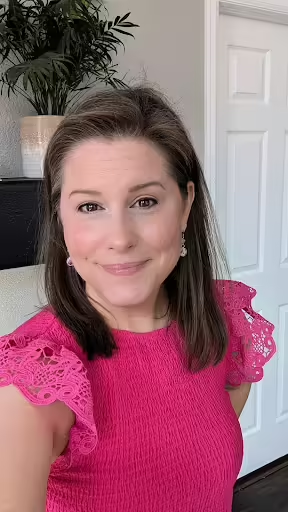
About the author
Brandie Smith is a breast cancer survivor and seasoned user experience researcher. As a voice for the user in her professional life, she now channels that same passion into patient advocacy, empowering women with the knowledge and support they need to make informed health decisions.

